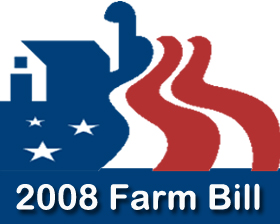Related Research Articles

The United States Department of Agriculture (USDA) is the federal executive department responsible for developing and executing federal laws related to farming, forestry, rural economic development, and food. It aims to meet the needs of commercial farming and livestock food production, promotes agricultural trade and production, works to assure food safety, protects natural resources, fosters rural communities and works to end hunger in the United States and internationally. It is headed by the secretary of agriculture, who reports directly to the president of the United States and is a member of the president's Cabinet. The current secretary is Tom Vilsack, who has served since February 24, 2021.

In the United States, the Supplemental Nutrition Assistance Program (SNAP), formerly known as the Food Stamp Program, is a federal government program that provides food-purchasing assistance for low- and no-income people to help them maintain adequate nutrition and health. It is a federal aid program administered by the U.S. Department of Agriculture (USDA) under the Food and Nutrition Service (FNS), though benefits are distributed by specific departments of U.S. states.

The Economic Research Service (ERS) is a component of the United States Department of Agriculture (USDA) and a principal agency of the Federal Statistical System of the United States. It provides information and research on agriculture and economics.
The Foreign Agricultural Service (FAS) is the foreign affairs agency with primary responsibility for the United States Department of Agriculture's (USDA) overseas programs – market development, international trade agreements and negotiations, and the collection of statistics and market information. It also administers the USDA's export credit guarantee and food aid programs and helps increase income and food availability in developing nations by mobilizing expertise for agriculturally led economic growth. The FAS mission statement reads, "Linking U.S. agriculture to the world to enhance export opportunities and global food security," and its motto is "Linking U.S. Agriculture to the World."

The Risk Management Agency (RMA) is an agency of the U.S. Department of Agriculture, which manages the Federal Crop Insurance Corporation (FCIC). The current Administrator is Marcia Bunger.

The Federal Agriculture Improvement and Reform Act of 1996, known informally as the Freedom to Farm Act, the FAIR Act, or the 1996 U.S. Farm Bill, was the omnibus 1996 farm bill that, among other provisions, revises and simplifies direct payment programs for crops and eliminates milk price supports through direct government purchases.
American Farmland Trust (AFT) is a non-profit organization in the United States with a mission to protect farmland, promote environmentally sound farming practices, and keep farmers on the land. AFT is staffed by farmers, policy experts, researchers, and scientists, and governed by a board of directors. Its headquarters are in Washington, D.C., and it has regional offices throughout the country. AFT also runs the Farmland Information Center, an online collection of information on farmland and ranchland protection and stewardship established as a public-private partnership with the USDA Natural Resources Conservation Service.
The Under Secretary for Research, Education, and Economics is a high-ranking official within the United States Department of Agriculture that provides leadership and oversight for the Agricultural Research Service, National Institute of Food and Agriculture, Economic Research Service, National Agricultural Library, National Agricultural Statistics Service.

In the United States, the farm bill is the primary agricultural and food policy instrument of the federal government. Every five years, Congress deals with the renewal and revision of the comprehensive omnibus bill.

The Food, Conservation, and Energy Act of 2008 was a $288 billion, five-year agricultural policy bill that was passed into law by the United States Congress on June 18, 2008. The bill was a continuation of the 2002 Farm Bill. It continues the United States' long history of agricultural subsidies as well as pursuing areas such as energy, conservation, nutrition, and rural development. Some specific initiatives in the bill include increases in Food Stamp benefits, increased support for the production of cellulosic ethanol, and money for the research of pests, diseases and other agricultural problems.
The agricultural policy of the United States is composed primarily of the periodically renewed federal U.S. farm bills. The Farm Bills have a rich history which initially sought to provide income and price support to US farmers and prevent them from adverse global as well as local supply and demand shocks. This implied an elaborate subsidy program which supports domestic production by either direct payments or through price support measures. The former incentivizes farmers to grow certain crops which are eligible for such payments through environmentally conscientious practices of farming. The latter protects farmers from vagaries of price fluctuations by ensuring a minimum price and fulfilling their shortfalls in revenue upon a fall in price. Lately, there are other measures through which the government encourages crop insurance and pays part of the premium for such insurance against various unanticipated outcomes in agriculture.

The National Institute of Food and Agriculture (NIFA) is a U.S. federal government body whose creation was mandated in the Food, Conservation, and Energy Act of 2008. Its purpose is to consolidate all federally funded agricultural research, and it is subordinate to the Department of Agriculture. It replaced the Cooperative State Research, Education, and Extension Service in 2009. As of April 11, 2022, Dionne Toombs has served as the Acting Director.

Mark Everett Keenum is an agricultural economist who is the 19th and current university president of Mississippi State University.

The Agricultural Research, Extension, and Education Reform Act of 1998 was separate legislation that revised and reauthorized federally supported agricultural research, education, and extension programs from June 1998 through May 2002. The 1998 Act built upon reforms that were made in the research title of the farm law in effect at the time, the 1996 farm bill. Key provisions were new accountability measures for recipients of federal research funds, and a new competitive research grant program called the Initiative for Future Agriculture and Food Systems, for which mandatory funds were authorized. The 1998 law's provisions, as well as new revisions of research, education, and extension policies, are included in Title VII of the 2002 farm bill.

The Food, Agriculture, Conservation, and Trade (FACT) Act of 1990 — P.L. 101-624 was a 5-year omnibus farm bill that passed Congress and was signed into law.

The Food Security Act of 1985, a five-year omnibus farm bill, allowed lower commodity price, income supports, and established a dairy herd buyout program. This 1985 farm bill made changes in a variety of other USDA programs. Several enduring conservation programs were created, including sodbuster, swampbuster, and the Conservation Reserve Program.

The United States Food and Agriculture Act of 1977 was an omnibus farm bill. The S. 275 legislation was passed by the 95th U.S. Congressional session and signed into law by the 39th President of the United States Jimmy Carter on September 29, 1977.
United States enterprise law is the body of law concerning networks, platforms, utilities, public services and the regulation of other enterprises or business entities. It is based on federal statutes, state statutes, and case law, that seek to guarantee human rights, particularly economic and social rights.

The Cooperative State Research, Education, and Extension Service (CSREES) was an extension agency within the U.S. Department of Agriculture (USDA), part of the executive branch of the federal government. The 1994 Department Reorganization Act, passed by Congress, created CSREES by combining the former Cooperative State Research Service and the Extension Service into a single agency.

Tambra Raye Stevenson is an African-American entrepreneur, nutrition educator, public speaker, policy advisor, inventor, and food justice activist. Stevenson founded WANDA and NativSol Kitchen. She is a Nutrition and Health Co-chair for the DC Food Policy Council, a Committee member for the National Agricultural Research, Extension, Education, and Economics (NAREEE) Advisory Board, and was named National Geographic Traveler of the Year in 2014.
References
- 1 2 "Legislation | NAREEE Advisory Board". nareeeab.ree.usda.gov. Retrieved 2022-01-27.
- ↑ "Federal Agriculture Improvement and Reform Act of 1996" (PDF). April 4, 1996. Retrieved January 27, 2022.
 This article incorporates public domain material from Jasper Womach. Report for Congress: Agriculture: A Glossary of Terms, Programs, and Laws, 2005 Edition (PDF). Congressional Research Service.
This article incorporates public domain material from Jasper Womach. Report for Congress: Agriculture: A Glossary of Terms, Programs, and Laws, 2005 Edition (PDF). Congressional Research Service.